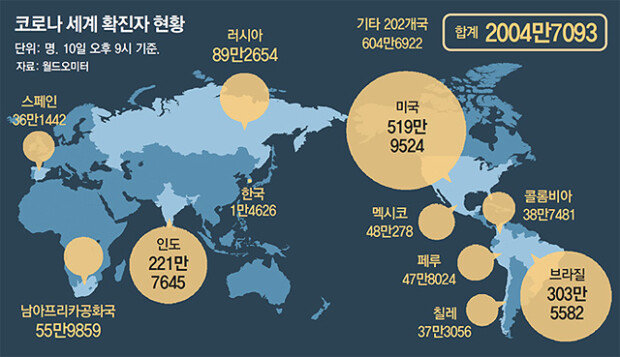U.S., Brazil, India make up half of total COVID-19 infections
U.S., Brazil, India make up half of total COVID-19 infections
Posted August. 11, 2020 07:56,
Updated August. 11, 2020 07:56

The cumulative number of COVID-19 confirmed cases worldwide reached 20 million as of Monday, seven months after “pneumonia of unknown etiology” was first reported to the World Health Organization (WHO) by China on December 31, last year.
According to Worldometers, a statistics website, the global cumulative confirmed cases stood at 20,026,186 with 734,020 deaths as of 3 p.m. on Monday. The figures are rising sharply: It took about 180 days for confirmed cases to reach 10 million on June 28 and only another 43 days to more than double.
The rapid increase has been driven by the United States, Brazil and India, which are the top three nations with the highest number of confirmed cases where the coronavirus outbreak shows no sign of easing. They are also some of the most populated nations in the world with populations estimated at 330 million, 210 million and 1.4 billion, respectively. Their combined cumulative infections amount to 10 million, and the top five countries, which include Russia and South Africa, take up 59.4 percent of the entire confirmed cases. All of them are plagued by inadequate responses to the pandemic by their leaders, vulnerable medical systems, great inequality and the lack of public awareness about the importance of heeding expert advice.
More than 25 percent of the global confirmed cases came from the United States which recorded 5,199,444 cumulative confirmed cases. Whereas densely populated northeastern states such as New York and New Jersey saw a huge jump in infections early on, coronavirus cases are now spiking in the south, which are home to many holiday destinations such as Florida, Texas and California. Some experts say that the Trump administration’s premature lifting of restrictions for the presidential election in November, American culture that emphasizes individual freedom and reluctance to follow advice or orders have contributed to the trend.
Brazil and India will likely be hit harder by the pandemic with a larger low income group and unequal access to medical services depending on the region. There is also a possibility that these countries have much higher figures than reported considering their data is less credible than that of advanced countries.
Youn-Jong Kim zozo@donga.com







